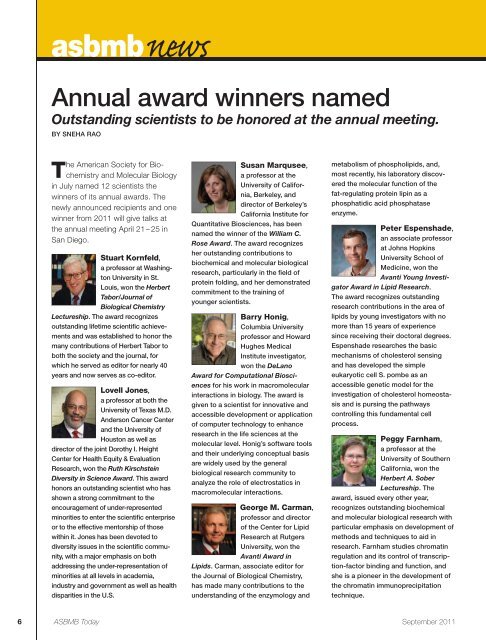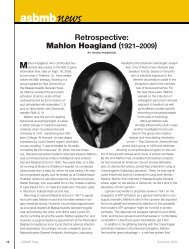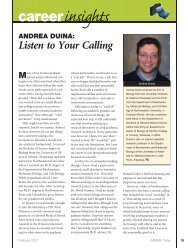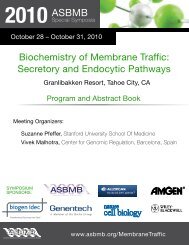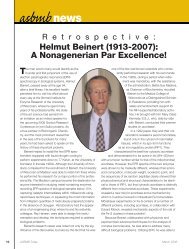asbmbnews
asbmbnews
asbmbnews
You also want an ePaper? Increase the reach of your titles
YUMPU automatically turns print PDFs into web optimized ePapers that Google loves.
<strong>asbmbnews</strong><br />
Annual award winners named<br />
Outstanding scientists to be honored at the annual meeting.<br />
BY SNEHA RAO<br />
The American Society for Biochemistry<br />
and Molecular Biology<br />
in July named 12 scientists the<br />
winners of its annual awards. The<br />
newly announced recipients and one<br />
winner from 2011 will give talks at<br />
the annual meeting April 21 – 25 in<br />
San Diego.<br />
Stuart Kornfeld,<br />
a professor at Washington<br />
University in St.<br />
Louis, won the Herbert<br />
Tabor/Journal of<br />
Biological Chemistry<br />
Lectureship. The award recognizes<br />
outstanding lifetime scientific achievements<br />
and was established to honor the<br />
many contributions of Herbert Tabor to<br />
both the society and the journal, for<br />
which he served as editor for nearly 40<br />
years and now serves as co-editor.<br />
Lovell Jones,<br />
a professor at both the<br />
University of Texas M.D.<br />
Anderson Cancer Center<br />
and the University of<br />
Houston as well as<br />
director of the joint Dorothy I. Height<br />
Center for Health Equity & Evaluation<br />
Research, won the Ruth Kirschstein<br />
Diversity in Science Award. This award<br />
honors an outstanding scientist who has<br />
shown a strong commitment to the<br />
encouragement of under-represented<br />
minorities to enter the scientific enterprise<br />
or to the effective mentorship of those<br />
within it. Jones has been devoted to<br />
diversity issues in the scientific community,<br />
with a major emphasis on both<br />
addressing the under-representation of<br />
minorities at all levels in academia,<br />
industry and government as well as health<br />
disparities in the U.S.<br />
Susan Marqusee,<br />
a professor at the<br />
University of California,<br />
Berkeley, and<br />
director of Berkeley’s<br />
California Institute for<br />
Quantitative Biosciences, has been<br />
named the winner of the William C.<br />
Rose Award. The award recognizes<br />
her outstanding contributions to<br />
biochemical and molecular biological<br />
research, particularly in the field of<br />
protein folding, and her demonstrated<br />
commitment to the training of<br />
younger scientists.<br />
Barry Honig,<br />
Columbia University<br />
professor and Howard<br />
Hughes Medical<br />
Institute investigator,<br />
won the DeLano<br />
Award for Computational Biosciences<br />
for his work in macromolecular<br />
interactions in biology. The award is<br />
given to a scientist for innovative and<br />
accessible development or application<br />
of computer technology to enhance<br />
research in the life sciences at the<br />
molecular level. Honig’s software tools<br />
and their underlying conceptual basis<br />
are widely used by the general<br />
biological research community to<br />
analyze the role of electrostatics in<br />
macromolecular interactions.<br />
George M. Carman,<br />
professor and director<br />
of the Center for Lipid<br />
Research at Rutgers<br />
University, won the<br />
Avanti Award in<br />
Lipids. Carman, associate editor for<br />
the Journal of Biological Chemistry,<br />
has made many contributions to the<br />
understanding of the enzymology and<br />
metabolism of phospholipids, and,<br />
most recently, his laboratory discovered<br />
the molecular function of the<br />
fat-regulating protein lipin as a<br />
phosphatidic acid phosphatase<br />
enzyme.<br />
Peter Espenshade,<br />
an associate professor<br />
at Johns Hopkins<br />
University School of<br />
Medicine, won the<br />
Avanti Young Investigator<br />
Award in Lipid Research.<br />
The award recognizes outstanding<br />
research contributions in the area of<br />
lipids by young investigators with no<br />
more than 15 years of experience<br />
since receiving their doctoral degrees.<br />
Espenshade researches the basic<br />
mechanisms of cholesterol sensing<br />
and has developed the simple<br />
eukaryotic cell S. pombe as an<br />
accessible genetic model for the<br />
investigation of cholesterol homeostasis<br />
and is pursing the pathways<br />
controlling this fundamental cell<br />
process.<br />
Peggy Farnham,<br />
a professor at the<br />
University of Southern<br />
California, won the<br />
Herbert A. Sober<br />
Lectureship. The<br />
award, issued every other year,<br />
recognizes outstanding biochemical<br />
and molecular biological research with<br />
particular emphasis on development of<br />
methods and techniques to aid in<br />
research. Farnham studies chromatin<br />
regulation and its control of transcription-factor<br />
binding and function, and<br />
she is a pioneer in the development of<br />
the chromatin immunoprecipitation<br />
technique.<br />
6 ASBMB Today September 2011


